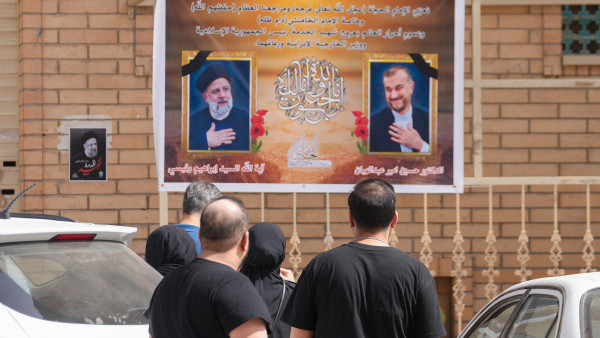People walk on May 20, 2024 in the central Iraqi holy city of Najaf, past portraits of Iran’s President Ebrahim Raisi (L) and Foreign Minister Hossein Amir-Abdollahian (R). [Getty]
The deaths of Iranian President Ebrahim Raisi and Foreign Minister Hossein Amir-Abdollahian in a helicopter crash on Sunday are unlikely to significantly alter the Islamic Republic’s relationship with neighbouring Iraq, according to Iraqi political analysts.
Iran’s Supreme Leader Ali Khamenei expressed his condolences on Monday following the deaths of Raisi and Amir-Abdollahian, state media reported. Khamenei declared five days of public mourning and announced that Vice President Mohammad Mokhber would assume interim duties, with 50 days to organize elections in coordination with the judiciary and legislative heads.
The helicopter, carrying Raisi and other officials, crashed in East Azerbaijan province. Rescue teams found the wreckage early Monday, confirming Raisi’s death. Iraq was the first Arab country to release a statement following the announcement, while Raisi was supposed to make his first visit to Iraq “soon,” reports said in early May.
“Iran is a state of institutions and power centres whose national security decisions vary in terms of tools but ultimately adhere to the general guidelines set by Supreme Leader Ali Khamenei. The plane crash that killed Iranian President Ebrahim Raisi and Foreign Minister Hossein Amir-Abdollahian will have more internal repercussions on the distribution of decision-making centres than external ones,” Iraqi political analyst Ahmed Al-Adadh told The New Arab.
“Consequently, it will result in a slight change in the tactics of formulating general policies, but not in the goals set by the Iranian National Security Council under the supervision of the Supreme Leader. Iran is a state of institutions with a pragmatic policy, and its institutions adapt to regional and international changes,” Adadh added.
Iraqi Prime Minister Mohammed Shia al-Sudani expressed his “sincere condolences to the Iranian government and its people” on the death of Raisi and his companions in the accident. The Iraqi president, Abdul Latif Jamal Rasheed, the President of the Kurdistan region, Nechirvan Barzani, and leaders of the Iraqi and Kurdish political parties all expressed their condolences to the Iranian government and its people.
Since the ouster of late dictator Saddam Hussein following the US-led invasion of Iraq in 2003, Iran has been a critical player in the Iraqi political and military scene. Tehran has armed and funded several Shia militias, some of which have become integrated into Iraq’s security forces.
The Quds Force, the Islamic Revolutionary Guard Corps (IRGC) foreign espionage and paramilitary arm, is supervising the Iraqi militias.
The Iraqi government on Monday declared a one-day national mourning on Tuesday following the death of Iranian president Raisi and other senior figures.
“In solidarity with the brotherly Iranian people and their leadership during these difficult times, and in sympathy with the feelings of sorrow and grief over the passing of the President of the Islamic Republic of Iran, Ebrahim Raisi, Foreign Minister Hossein Amir-Abdollahian, and their companions in the tragic incident, the Iraqi government announces a one-day national mourning period throughout Iraq tomorrow, Tuesday,” government spokesman Basem Al-Awadi stated in a press release.
On the other hand, Yassin Taha, a Kurdish political analyst, said to TNA that he did not think the incident would significantly impact Iraq.
“I think it would not have a large impact on bilateral relations between Iraq and Iran because IRGC’s Quds Force runs the foreign affairs dossier of Iraq and other countries that do not have stable security conditions,” Taha told TNA. “All Iranian ambassadors appointed in Iraq following 2003 were all affiliated with IRGC, although they are employees at the Iranian foreign ministry. Quds Force runs Iran’s relations with Iraq.”
He also clarified that relations between Iraq and Iran are primarily based on political relations Iraqi parties have with Iran, followed by relations with the Quds Force and, lastly, with the Iranian government, which are mostly related to trade and services. He said Iraq’s ties with Iran will continue as normal until a new president is elected for Iran, and the deaths of Raisi and Amir-Abdollahian will not greatly affect those relations.
He also mentioned that Raisi was scheduled to visit Iraq to sign some treaties, and now, with Iran busy with funerals and the early elections, this might lead to a delay in those treaties and projects.

